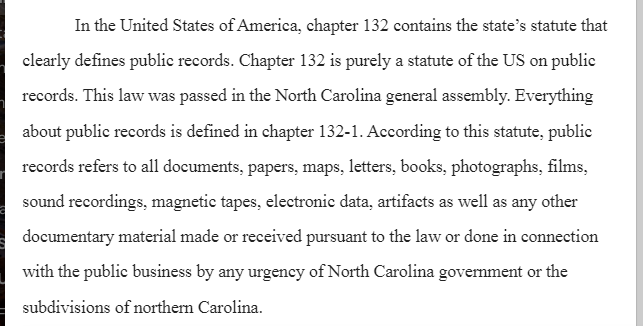Learning by Doing-State Laws
Learning by Doing-State Laws
Using library or Internet resources provide a full citation for each of the following items:
- Your state’s statute that defines what is considered to be a public record that must be made available to the public upon request.
- The pre-World War I opinion by the U.S. Supreme Court holding, on re-argument, that a federal income tax was unconstitutional.
- The federal statute authorizing the U.S. Secretary of Transportation to make payments to states for the value of materials stockpiled near federal highway construction projects in conformity with the project specifications.
- The federal joint regulation of the U.S. Fish & Wildlife Service, Department of the Interior, National Oceanic and Atmospheric Administration, and Department of Commerce, identifying the factors for listing, delisting, or reclassifying endangered species.
- Your state’s administrative regulations specifying the licensure process for real estate agents.
- The local ordinance in your municipality governing noise.
- The most recent opinion of your state’s highest appeals court describing the extent to which the state constitution requires that the power of eminent domain be exercised only for a public use.
- A recent federal trial court decision in your federal district describing the standard for summary judgment in federal court.
- A law-review article published within the past five (5) years about libel law and political campaign advertisements.
Your assignment must:
- Be typed, double spaced, using Times New Roman font (size 12), with one-inch margins on all sides; citations and references must follow APA or school-specific format. Check with your professor for any additional instructions.
- Include a cover page containing the title of the assignment, the student’s name, the professor’s name, the course title, and the date. The cover page and the reference page are not included in the required assignment page length.
The specific course learning outcomes associated with this assignment are:
- Interpret the language of the U.S. Constitution and the U.S. legal system in order to explain the principles and process of constitutional, regulatory, and administrative laws at the federal and state levels.
- Use the “case” approach to the U.S. legal system for researching cases, laws, and other legal communications using technology and information resources.
- Assess legal decisions related to the administration of public goods.
- Use technology and information resources to research issues in constitution and administrative law.
Grading for this assignment will be based on answer quality, logic/organization of the paper, and language and writing skills, using the following criteria:
- Questions 1 through 3, and 5 through 9 are worth 10 points each
- Question 4 is worth 20 points
Answer Preview-Learning by Doing-State Laws

$5.00
